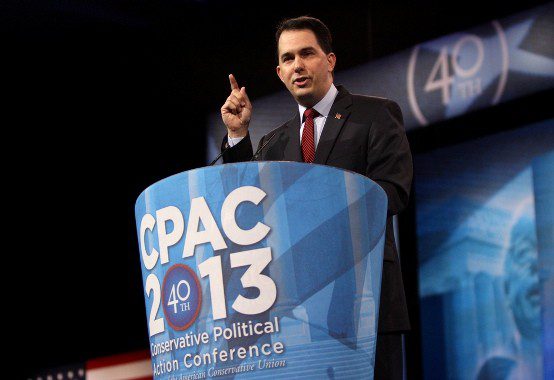Walker and the War on ISIS

Unfortunately, Walker’s position on the war on ISIS is all too predictable:
Wisconsin Gov. Scott Walker says he is open to sending U.S. troops to the Middle East to combat Islamic State fighters, but the potential Republican contender for 2016 presidential nomination isn’t calling for them immediately.
Walker told ABC’s “This Week” on Sunday that he wouldn’t rule out sending American forces abroad to confront threats to the United States or its allies. He also says President Barack Obama has not been aggressive enough in confronting threats from Islamic State fighters.
So Walker is prepared to escalate an unnecessary war, and he probably assumes that the smart move politically is to insist on a more aggressive policy without ever really defining what he means by this. That is a serious mistake as a matter of policy, and it’s also a misreading of the public’s level of support for the war. There continues to be majority support for the ISIS war because it isn’t producing American casualties, but that support is likely very tenuous and depends on keeping the war in the background. Most Americans remain opposed to sending ground forces into combat against ISIS, and there is no appetite for another prolonged ground war in that or any other part of the world. If that is what voters can reasonably expect from a Walker administration, that would be one good reason to reject his candidacy.
Walker’s statements raise a number of questions. If he were president, what purpose does he think would be served by sending American ground forces into combat? What U.S. interests does he think are so threatened that demand this response? How long would he be willing to commit U.S. ground forces to a fight against ISIS? Would they be sent into Syria, or limited to fighting in Iraq? Or would he reject limiting the fight to those two countries? Would he be willing to send U.S. forces into Libya after groups that are nominally aligned with ISIS? Under what circumstances, if any, would he be prepared to withdraw them? Since Walker is intends to run for president, he should be expected to have answers to these questions. When Walker says, “I wouldn’t rule anything out,” does that mean that he hasn’t given much thought to any of these questions, or is he really that irresponsible?
None of the candidates should be able to support escalating a war without answering these and other relevant questions. That is especially true for the current and former governors that want to indulge in hawkish rhetoric without thinking through the implications of what they’re saying. Raddatz did a little of this in challenging Walker’s vague calls for an “aggressive strategy” against ISIS, but it wasn’t nearly enough. Walker should continue to be pressed on this to clarify how aggressive his “aggressive strategy” would be.
Earlier in the interview, Walker said something that should terrify anyone interested in foreign policy restraint and peace:
I look at actually this weekend got to see not only Henry Kissinger, but former Secretary of State George Shultz, (inaudible), and even Madeleine Albright, who I think very highly of on foreign affairs [bold mine-DL].
It would be one thing if Walker were just dropping the name of a former Secretary of State from the other party to provide a sort of bipartisan “balance” here, but he makes a point of approving of Albright on foreign policy. This is the same Albright who berated Powell, “What’s the point of having this superb military you’re always talking about if we can’t use it?” Walker’s admiration for her will no doubt please the acolytes of the cult of American “indispensability,” but for the rest of us it is a clear warning that he buys into many of the worst assumptions about U.S. “leadership” and activism overseas.